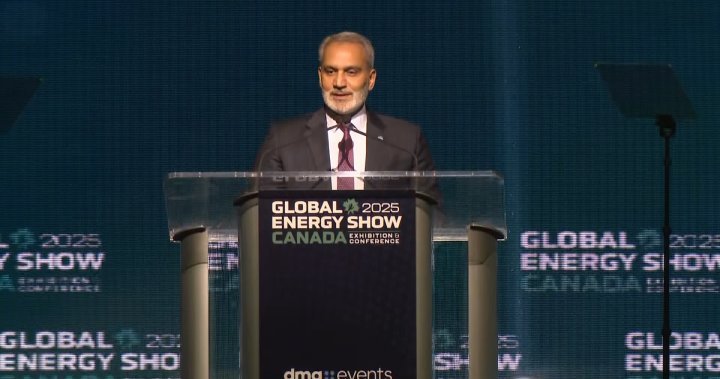Physical Address
304 North Cardinal St.
Dorchester Center, MA 02124
Physical Address
304 North Cardinal St.
Dorchester Center, MA 02124

There is no maximum at the global oil demand for the horizon, and the next decades will require trillion investment to meet this need, the Secretary General Organization of oil exporting countries said Tuesday at address to Global energy show Calgary.
The primary energy demand is expected to increase by 24 percent from now to 2050, exceeding 120 million barrels a day, said Haitham al-ghais.
He added that at the time, $ 17.4 in trillion would be needed.
The Secretary General of OPEC predicts that world energy demand will increase by 24 percent by 2050.
File photo
“OPEC forecasts are not ideology based. They are based on data and data analysis, and they clearly indicate that oils will still be an integral part of the energy mixture in about 30 percent, which is still in 2050,” said Al-Ghais.
“Simply put, ladies and gentlemen, there is no peak at the horizon for oil demand.”
Al-Ghais criticized the International Energy Agency for sending mixed signals to industry in recent years-first of all, that the oil should be a global energy security corner, then saying that oil investments should not be done under a zero scenario and then returns to the previous point of view.

Get the main news of the day, political, economic and current headlines that deliver once a day to your inbox.
“Every couple of years, if they want to remain reliable and appropriate, bodies entrusted with global energy policy, should not change the course,” he said.
Businesses need certainty for long -term projects, and insufficient investment in the oil and gas industry is a “dangerous thing,” he said.
“It undermines energy security and market stability and causes increased volatility worldwide that affects producers, but not just manufacturers, more importantly, it actually affects consumers and, of course, a wider global economy.”
Al-Ghais said OPEC perceives climate change “very, very serious”, but expressed concern about the zero targets of the network, which he called “unrealistic”, “fixed on time” and “separated from reality”.
“We welcome recent directions to a policy based on pragmatic energy reality, and it recognizes that we are facing the emission challenge, not the challenge of energy,” Al-Ghais said, noting that OPEC members are signatories to the Paris climate agreement and recognize the important role of renewable energy and carbon.
OPEC Secretary General said his organization admires what Alberta has done as an energy producer.
“As a result, Canada has become the main global – and I underline the word global – oil supplier,” he said.
Liza Baiton, president and executive director of the Canadian Oil Producers Association, told the conference that the market was beginning to appear to believe that the “transition of energy” has not begun, but rather a “energy supplement”.
“We see the demand for energy that is just growing exponentially,” she said.
“It is great that renewable energy sources are increasing, but it will only be layered above the usual oil and gas increase to meet global demand.”
Canadian Oilsands Giant Cenovus Energy Inc. President and CEO Jon McKenzy told reporters at the conference that he agrees that more industry investments are needed, and industry players have what it takes to meet the challenge.
“This is the industry that is doing a really good job to get productive and regain costs.”
& Copy of 2025. The Canadian Press
